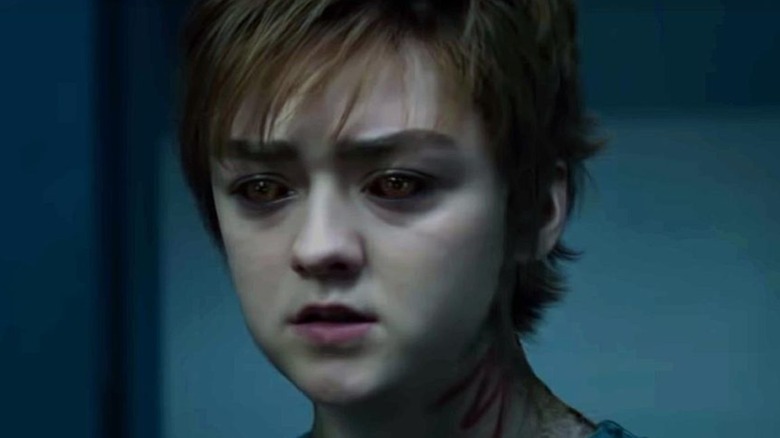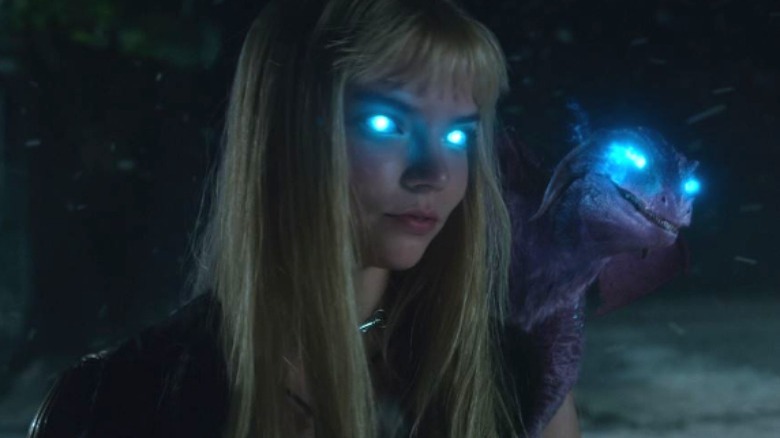Where Does The New Mutants Fall In The X-Men Timeline?
The "X-Men" film franchise from 20th Century Studios — formerly known as 20th Century Fox — contributed greatly to the rise of the superhero genre in the early 2000s. Kicking things off with 2000's "X-Men," the series went on to include a total of 13 feature films, each leaving their mark on the comic book movie world for better or worse. However, unlike the sprawling Marvel Cinematic Universe, which shows no sign of stopping, the "X-Men" saga is officially over as of the debut of director Josh Boone's oft-forgotten "New Mutants" in August 2020.
"The New Mutants" stands among the more infamous "X-Men" titles, and it's not hard to see why. Constant release delays, extensive reshoots, the sale of 20th Century Fox to The Walt Disney Company, and its lackluster marketing campaign ensured it fought an uphill battle to find its audience — something it largely failed to do. It didn't make back anything close to its estimated budget and didn't exactly impress critics or general audiences, leaving it to fall into relative obscurity shortly after its overdue arrival. Nevertheless, despite its shortcomings, it's still a part of the "X-Men" canon all the same.
With that in mind, if one were to embark on an "X-Men" movie marathon, when does "The New Mutants" factor in? Here's where it lands on the timeline.
New Mutants' canon status is a bit foggy
It's no secret to anyone who's an "X-Men" fan that the continuity of these films can be a bit wishy-washy. Certain events and plot points are either ignored or totally overwritten, characters are redesigned from the ground up, and their relation to one another is revised, and fans are often left to wonder which entries are essential and which are irrelevant. Thankfully, with an almost entirely brand new cast of characters and a self-contained narrative, "The New Mutants" doesn't find itself bogged down by this kind of baggage — meaning its exact place in the timeline is somewhat up to fan discretion.
"It started being in the original 'X-Men' timeline, ended up completely its own thing, still with connections to 'X-Men' and all that, and obviously in the same universe, but not tethered to the 'Dark Phoenix' universe," Josh Boone told Den of Geek in August of 2020, confirming that "New Mutants" isn't entirely a standalone feature, but it's far from a direct sequel. At the same time, the movie isn't totally devoid of timestamps that hint at where it fits in the canon.
First and foremost, the characters note that both the X-Men and Xavier's School for Gifted Youngsters are still active. Therefore, it stands to reason that "New Mutants" sits sometime prior to 2017's "Logan" (which takes place in 2029) but not after the 2028 Westchester Incident, where Professor Charles Xavier (Patrick Stewart) suffered from a seizure that led him to lose control of his telepathic powers and kill most of the X-Men — destroying his school in the process.
To further pinpoint where "New Mutants" slots into the franchise, as Screen Rant points out, an interaction between Dani Moonstar (Blu Hunt) and Dr. Reyes (Alice Braga) provides a vital clue. When Dani looks into Reyes' mind, she sees a young mutant being held and observed at a Transigen facility. This same footage appeared in "Logan," so "New Mutants" likely lands in the 2024-2027 range so long as we ignore the Milbury Hospital's outdated equipment.
"The New Mutants" is far from an essential piece of the "X-Men" puzzle, but it's still worth the watch if you're a fan of the titular team. If you're a stickler for continuity, you should watch it just before "Logan," but if you're not, there's no shame in enjoying it as a freestanding film.

